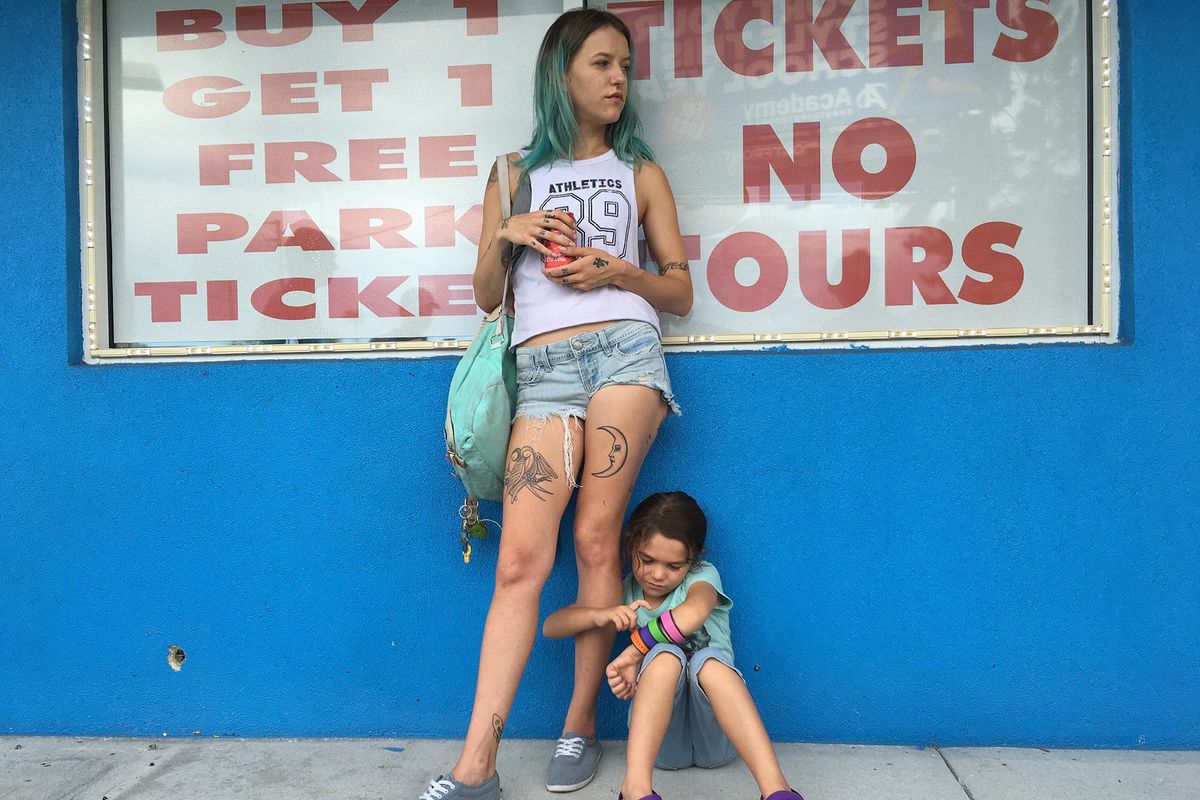Review: In seedy shadows of Disney World, a child tries to make a magic kingdom in ‘The Florida Project’

“The Florida Project,” Sean Baker’s exuberant, ungovernable ode to the innocence and resilience of childhood, takes place in a ramshackle lavender-painted hotel called the Magic Castle, hard by Orlando’s Disney World. Along with its neighboring oxymoronically named fleabags, the Magic Castle evokes the American Dream, while denying it at every downbeat, threadbare turn. It’s American Dream-adjacent, with such middle-class advantages as financial security, leisure and cozy domestic stability tantalizingly visible but always just out of reach.
But that doesn’t mean that the margins don’t possess their share of enchantment. As “The Florida Project” opens, its spirited 6-year-old protagonist, Moonee (newcomer Brooklynn Prince), is busy leading her friends on a game of mayhem and mischief throughout the stucco complex, which serves as cheap housing for her young mother, Halley (Bria Vinaite), and a handful of folks who are struggling with addiction, homelessness, mental illness or simple bad luck.
It’s a harsh, hardscrabble life, but Baker is determined to infuse it with wonder and its own brand of profane dignity. An independent, precocious heroine in the tradition of Scout in “To Kill a Mockingbird,” Moonee navigates circumstances not of her making, but ones she nonetheless makes her own by way of fantasies, games and the occasional sweet-faced panhandling gambit to cadge some ice cream from unsuspecting tourists.
Baker, whose breakout 2015 film “Tangerine” was filmed entirely on an iPhone, here trades that modest platform for lush 35mm film, fashioning a big, bright, improbably optimistic-looking canvas for a story steeped in heartbreak. The volatile, unreliable Halley, who resorts to prostitution when she can’t make the Magic Castle’s weekly rent, is little more than a kid herself. Moonee’s street hustles and street-urchin scams may look adorably spunky now, but they suggest a far less rosy future down the road.
Baker doesn’t superimpose those judgments. Instead, he presents “The Florida Project” as a respectful glimpse of a part of contemporary life that is often invisible to mainstream society. While the impulse is admirable, it results in a film that veers dangerously close to the kind of aestheticized poverty porn that bedeviled such similar enterprises as “Beasts of the Southern Wild” and “American Honey.”
And, too often, Baker over-directs Prince, Halley and their fellow young cast members, most of whom are nonprofessional actors and whose performances are so keyed-up and theatrical that the viewer can almost hear the director asking for another take, only this time with more. That over-the-topness stands in particularly unflattering relief compared to “The Florida Project’s” most revelatory moments, which belong to Willem Dafoe, who plays the Magic Castle’s patient, gently paternalistic manager Bobby.
Although Moonee is the nominal heroine of “The Florida Project,” it’s Bobby who emerges as the indefatigable moral center of a movie that pulses with life, if not hope. Dafoe delivers his finest performance in recent memory, bringing to levelheaded, unsanctimonious life a character who offers a glimmer of hope and caring within a world markedly short on both.